By Caroline Savitzky, Madagascar PHE Coordinator, Blue Ventures
I’m standing in the middle of Nosy Lava, the southernmost outpost of a constellation of tiny islands off Madagascar’s west coast. Despite their desolate-sounding name, the Barren Isles sit among one of the few remaining strongholds of thriving marine biodiversity in the western Indian Ocean. To my left, there’s a camp of “Vezo Vahiny” migrants who have travelled here from as far away as Velondriake in the south and Ambanja in the north. To my right, there’s a camp of “Zanan’tany” visitors from the nearest large town of Maintirano. Both of these groups are here in pursuit of better fishing grounds, and both struggle with the enormous health challenges present in such extreme conditions.
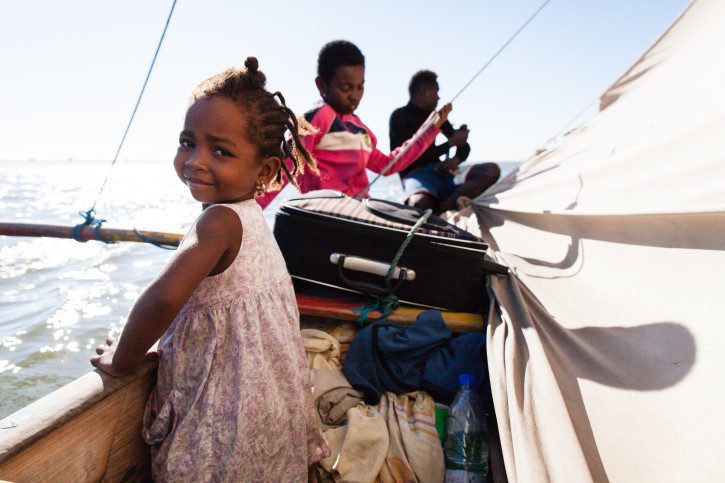
Men migrate seasonally, sometimes with their partners and children, up to 1,000 kilometres in outrigger pirogues in order to reach better fishing grounds in the Barren Isles. Photo © Garth Cripps.
I’m here to find out more about the various health issues that they face, what access to health information and services they already have, and what their priority unmet health needs are, in the hope that Blue Ventures might be able to address these with our health partners. We’ve done this effectively in our first two conservation sites in Madagascar (Velondriake and Belo sur Mer) and, having witnessed the benefits of integrating community health promotion with marine management and coastal livelihood initiatives, we’re keen to explore the potential for replicating this holistic approach in the Barren Isles. There’s strong community interest and motivation here, with great thirst for improved access to information and services, as demonstrated by many people staying on after the meetings I convene in order to ask reproductive health questions.
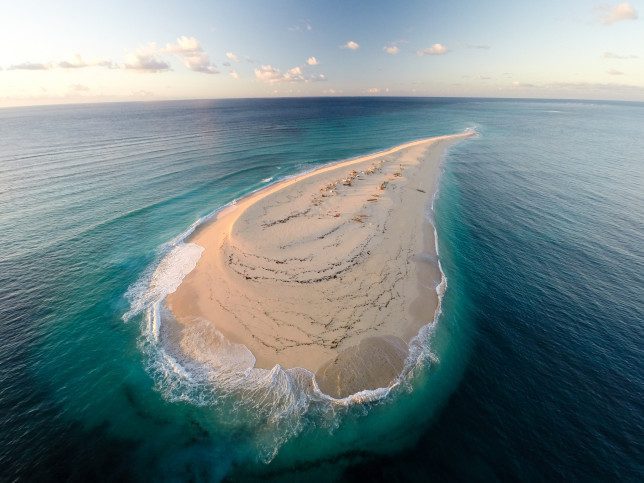
Aerial view of Nosy Manandra; a slender sand bar island in the Barren Isles archipelago that gets submerged during spring tides or ferocious rainy season storms. It’s home to a camp of migrant fishers; surely among the most under-served populations in the whole of Madagascar. Photo © Garth Cripps.
Over the course of my time on Nosy Lava, I hold focus groups with different community members; “Vezo Vahiny” women, “Vezo Vahiny” men, “Zanan’tany” women, “Zanan’tany” men. All face similar health problems; headaches, fevers, feeling dizzy and faint, rashes and open sores (I only see a few children on the island who don’t have fairly large open sores), stomach aches and diahorrea, coughs and respiratory illnesses, mouth ulcers, back pain (especially after strenuous work at sea), frequent likely STI symptoms and unmet family planning needs. There’s a complete lack of access to healthcare on the island.
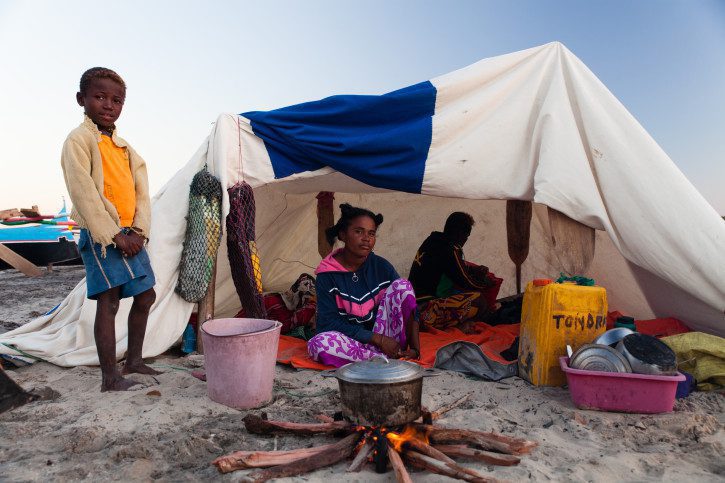
A migrant Vezo family uses their sail and oars to make a tent. Vezo means “people of the sea” in Malagasy; so-called because their cultural identity and way of life are intimately tied to the ocean. Photo © Garth Cripps.
The situation isn’t any better at Beloba, a remote fishing settlement on the adjacent mainland that I also visit. They’re very far away from public health centres, and community health agents can’t reach their village. Their health problems are broadly the same as the island migrants, and they identify family planning as a major unmet need as well. Most of the elderly women here report having at least 8 children, and are very interested in family planning as it’s difficult to support so many children.
One young woman, aged 17 years with two children, says it’s very hard for her to care for them as a single mother so she’d like to use family planning. Another woman with a 7-month old baby and already pregnant again says she really wants to be able to space her births, while the 20-year old woman with three children sitting next to her agrees immediately. In my focus group with young men in Beloba, several speak up about wanting to use family planning to make sure that they can support the children they have; these concerns also come up very frequently with the men who I speak to on Nosy Lava.
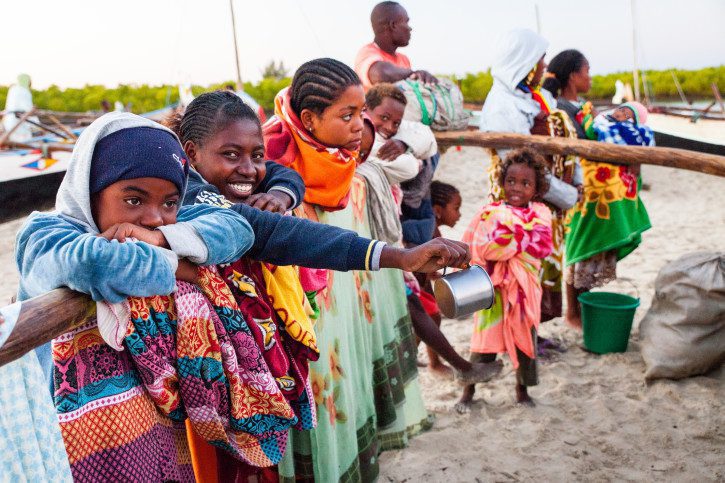
Vezo families en route to the Barren Isles. Photo © Garth Cripps.
Back on Nosy Lava, I note some subtle differences in access to health information and services reported by the two groups of migrants; the “Vezo Vahiny” only tend to go to Maintirano for medical attention in emergency situations, while the “Zanan’tany” are strikingly more informed about health issues in general and don’t hesitate to go to Maintirano (where they’re originally from) for routine as well as emergency healthcare, although it’s far away and the feasibility of the journey depends on sea conditions (if it’s rough they just can’t go).
Many of the “Vezo Vahiny” women are able to use family planning by stocking up on contraceptive pills from community-based distributors (CBDs) in Velondriake before they migrate for the season, or choosing a long-acting method with Marie Stopes Madagascar before making the journey, although their options are generally quite limited. For example, it’s much harder if they prefer to use depo-provera injections because these have to be administered every three months by CBDs, while the women normally go away to the Barren Isles for 9 months each year. Most of the “Zanan’tany” women are able to access family planning in Maintirano, but say that it would be better if a community health agent could reach them directly on the island, particularly for follow-ups and addressing other priority health needs.
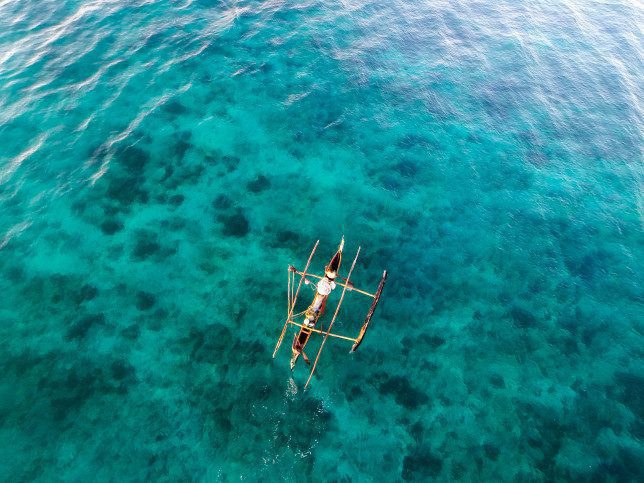
Fishing in crystal clear waters in the Barren Isles archipelago; this is the largest locally managed marine area in the Indian Ocean, whose legal status gives traditional resource users the formal rights to manage the fisheries upon which their livelihoods depend. Photo © Garth Cripps.
Across the spectrum from the fishers in isolated mainland settlements to the “Vezo Vahiny” and “Zanan’tany” migrants on remote islands, it quickly becomes very clear that there are an array of basic unmet health needs that we could usefully address in the Barren Isles, with various nuances according to population group and location. This is confirmed during my time in Maintirano town, where I meet with Ministry of Health officials, partner health NGOs, public health centre staff and community health agents to get their views.
Collaboration between these health service providers seems common already, and there is great openness to working together and being flexible in approaches in order to reach different isolated areas. Building on Blue Ventures’ strong existing partnership with JSI/MAHEFA* in Belo sur Mer (where they’ve trained local women as community health agents to provide health education and offer contraceptives in the villages where we support local marine conservation efforts), we discuss the possibility of working together in the area to train a few new community health agents in some remote mainland settlements like Beloba, and to have community health agents join Blue Ventures visiting the islands like Nosy Lava whenever we go there to facilitate marine management meetings.
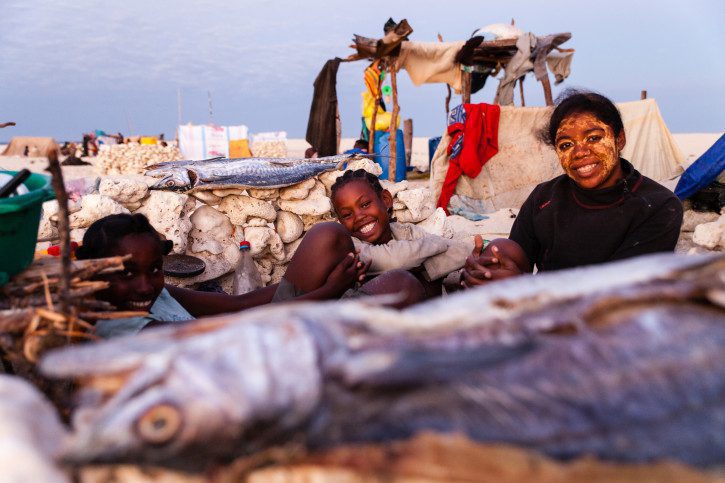
Women and children at the migrant fishing camp on Nosy Manandra; until now, there’s been a complete lack of access to healthcare on all of these islands in the Barren Isles archipelago. Photo © Garth Cripps.
Fast-forward three months and I’m back in Maintirano, having signed an exciting new partnership agreement with JSI/MAHEFA, in order to assist with the training of three new community health agents in a full package of basic healthcare provision!
From short-term contraceptive options to the management of common childhood illnesses like diarrhoea and respiratory infections, JSI/MAHEFA’s fantastic team take the new community health agents through a comprehensive curriculum of training and role-plays. On the third and fourth days, I have a few slots to facilitate special sessions about Blue Ventures’ holistic approach to integrating health promotion with natural resource management and alternative livelihoods, so that they can sensitise their communities about the links between these different initiatives. We approach these sessions with the use of games and active learning, as the connections between human and ecosystem health are easily identified and understood in a place where life is deeply connected to the natural environment.
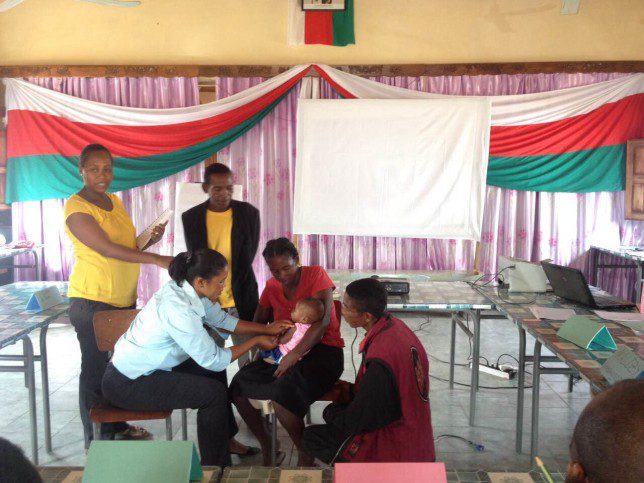
JSI/MAHEFA provides training in the management of common childhood illnesses; the new community health agent’s baby gets involved in a role-play! Photo © Caroline Savitzky.
Together with the Ministry of Health, JSI/MAHEFA and other health partners in the region, we’re hereby developing an effective and flexible model for bringing vital health services to isolated fishing settlements in the Barren Isles archipelago; a very different and arguably more challenging context than our first two conservation sites. We look forward to building on this promising start over the coming months, including exploring the possibility of doing some more focused environmental education training for community health agents with our conservation partner WWF (whose team kindly transported me from Morondava up to Maintirano with them last weekend, passing through Belo sur Tsiribihina where they’re also working with JSI/MAHEFA to coordinate activities).
It’s clear to me that this a time of great motivation and potential in the Barren Isles area. A management committee for the locally managed marine area has just been formalised, partnerships between health and conservation organisations are being enacted, and communities are both seeking and addressing their rights to access family planning and marine resources!
*With thanks to our partner JSI/MAHEFA for their valuable collaboration: The USAID-funded Madagascar Community-Based Integrated Health Project (CBIHP), known locally as MAHEFA, is a five-year program (2011-2016) implemented by JSI Research & Training Institute, Inc. that provides basic, quality health care to isolated populations in six of Madagascar’s most remote regions.

